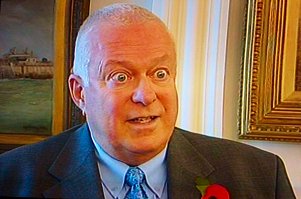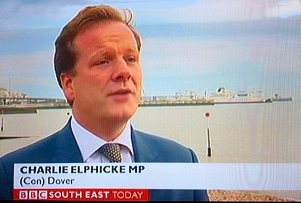10 November 2010Bob urges Charlie to drop his People's Plan and join up with DHB.
WE are all engaged in a kind of emotional but puzzling Port ping-pong at the moment. Ping and the ball of ideas hurtles over the net this way, hailing the Charlie Elphicke People's Port Plan, pong it returns with a whoosh with the Bob Goldfield full Port Privatisation Plan. We the people rubberneck in bewilderment as to which one is best. We go this way, we go that way...but we still dont know. The socialist option which is rather unusually being touted by a Conservative MP, as socialism and conservatism are rarely seen and rarely comfortable bedfellows, yet nevertheless Charlie's Plan has achieved most of the publicity and some say most of the popularity...engaging everyone with promises of a £10 stake, and to top it all off, a visit with full ballyhoo by Dame Vera Lynn herself, who appeared to rubberstamp the whole idea. On that day we surely saw those Bluebirds soaring again.
Bob's approach on the other hand has been somewhat quieter, with much less fanfare. We now hopefully can make up for some of the shortfall in publicity for Bob's Privatisation Plan, by adding our own bit to the mix here.....
..........below is the latest immediate release from DHB. It urges Charlie to abandon his ideas for a People's Port and join DHB in pursuit of the full privatisation plan.
Read on dear friends read on........
8 November 2010
DHB Response to the People’s Port Letter handed in to HM Government on the 1st November 2010.

Dover Harbour Board has had time to consider the further information on the People’s Port Proposal contained within the letter dated 1st November 2010, submitted to the government on that date. This release is the DHB response to the contents of that letter.
Firstly, DHB considers that the overall objectives of the Dover People’s Port Trust [DPPT}, recently articulated by the local MP, Charlie Elphicke, do in fact align with those of the DHB. We all want to see the port continue to develop, see the community as full members of the partnership between the Port and its major stakeholders and we want to help in the regeneration of the Town or Dover. This is what DHB’s privatisation scheme has always been working towards. However, we differ in how this can be achieved.
It is clear from the DPPT letter that the ambitions of the trust are totally unrealistic and undeliverable. In addition, the Trust members are making various promises to the community of stakeholders that they cannot possibly deliver using the trust as a vehicle in the way that they propose.
The DPPT appears, without any due diligence or business plan, to offer the government £200 million for the port. Despite making statements that the people of Dover would “own” the Port of Dover [at a minimal payment of only £10 per head], it is estimated that such ownership could only be achieved if each and every one of the people of Dover, 39,000 in all, contributed over £5,000 per head to the Trust, if they were to acquire a majority interest. The reality is that financial institutions would be financing the deal, if indeed any deal could be constructed in the way proposed.
The DPPT makes the promise of further investment in the port, to deliver the Terminal 2 investment almost immediately and to lower the tariffs to the customer ferry operators. However, it makes no allowance in its proposal for the required £85 million of investment required in the Eastern Docks over the next 5 years, to maintain essential capacity for the Port’s operators, or the £250 million needed to build Phase One of T2. Such an ambitious set of proposals and promises would clearly require substantial further investment. This would, without doubt, result in an unaffordable level of debt in the business.
The letter states that the investment will largely be funded by debt raised from the financial institutions; however, there is no indication of how this massive debt will be serviced. The existing port business is currently turning over £58 million per annum. Without a substantial rise in tariffs to the ferry operators, there is no way that such a debt could be serviced. So how can this early investment be achieved and how can the subsequent debt be financed by keeping tariffs low, as promised by DPPT?
The reality is that the promises are unaffordable. Furthermore; despite Mr Elphicke’s many statements that he wishes the port to be financed without using ‘foreign money’, the letter states that the potential funders are all ‘major international financial institutions’.
The DPPT appears to be suggesting that a regulator is appointed to oversee the tariffs paid by the operators. DHB has no objection in principle to regulation, but this would require both the agreement of government, a complete change of policy for a market led ports sector, and for the regulatory mechanism to also cover the activities of Eurotunnel, in our opinion a totally unrealistic proposal.
The DPPT states that there has been underinvestment in the port over recent years, a totally unsubstantiated and misleading statement. The facts are that DHB has spent over £125 million in the last 10 years on direct port investment, at the same time; the revenue earned from the ferry business is broadly the same in 2010 as it was in 1991.
The DPPT asks government to override the requirements of the 1991 Ports Act and treat them as a sole bidder, without any competitive or transparent sales tender process. Such a process is not possible under the 1991 Act and would require primary legislation, even if the government were prepared to ignore good governance and best practice and override a competitive bid process. This is just not credible.
The reality is that the DPPT is a political instrument and neither a commercial nor a practical business proposal. The People’s Port Proposal cannot be considered a serious proposal and the letter, full of inaccuracies, falsehoods and unsubstantiated statements cannot be considered a serious bid. However, if the DPPT does indeed think that it has a credible bid, then it should be challenged to enter the competitive bidding process on the existing DHB scheme when a sales process begins under tried and tested legislation.

We urge Mr Elphicke and his DPPT colleagues to acknowledge that their proposal is undeliverable and join with DHB in working to achieve a positive outcome from the privatisation process with all of the new opportunities that this will bring, for all of the port stakeholders, most especially the community of Dover. Only the DHB proposal has provided a definitive and deliverable commitment to immediate cash investment in Dover, through the settlement of £10 million cash to the Port of Dover Community Trust together with a further £20 million earmarked to deliver securities of such a value in the new organisation, clearly aligning the Port with the Town of Dover.
Ends.
The pictures show the main players as they appeared on TV this week.Top shot is Bob Goldfield the Chief Executive of the Dover Harbour Board, the other shot is of MP for Dover and Deal Charlie Elphicke. All previous frontpage features can be found in ALL RECENT FEATURES see menu. PB.

 Dover Harbour Board has had time to consider the further information on the People’s Port Proposal contained within the letter dated 1st November 2010, submitted to the government on that date. This release is the DHB response to the contents of that letter.
Dover Harbour Board has had time to consider the further information on the People’s Port Proposal contained within the letter dated 1st November 2010, submitted to the government on that date. This release is the DHB response to the contents of that letter. We urge Mr Elphicke and his DPPT colleagues to acknowledge that their proposal is undeliverable and join with DHB in working to achieve a positive outcome from the privatisation process with all of the new opportunities that this will bring, for all of the port stakeholders, most especially the community of Dover. Only the DHB proposal has provided a definitive and deliverable commitment to immediate cash investment in Dover, through the settlement of £10 million cash to the Port of Dover Community Trust together with a further £20 million earmarked to deliver securities of such a value in the new organisation, clearly aligning the Port with the Town of Dover.
We urge Mr Elphicke and his DPPT colleagues to acknowledge that their proposal is undeliverable and join with DHB in working to achieve a positive outcome from the privatisation process with all of the new opportunities that this will bring, for all of the port stakeholders, most especially the community of Dover. Only the DHB proposal has provided a definitive and deliverable commitment to immediate cash investment in Dover, through the settlement of £10 million cash to the Port of Dover Community Trust together with a further £20 million earmarked to deliver securities of such a value in the new organisation, clearly aligning the Port with the Town of Dover.